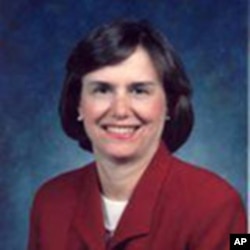Fifteen experts from around the world have been enlisted to help to help formulate policies to ensure food security and avoid a repeat of the food crisis of a few years ago.
They’ll serve as advisors to the Committee on World Food Security, an inter-governmental body of the United Nations.
Among those named to the High-Level Panel of Experts is Catherine Bertini, former head of the U.N. World Food Program. Bertini, now a professor at the Maxwell School of Citizenship and Public Affairs at the University of Syracuse.
“The state of food security today is unfortunately trending in the wrong direction. We had for many, many years positive trends, even though there were still many hungry people.”
But that’s changed. She says, “As a result of the economic crisis, the earlier food crisis of a couple of years ago, the fuel increases -- all of these contributed to more food insecure people, more hungry people in the world. And unfortunately that has continued.”
Growing agriculture
The food crisis resulted in an international effort to boost agricultural production. Bertini says that’s helped.
“Governments – both governments of developing countries and of donor countries – have realized that we must invest more in helping more productive agriculture and especially poor farmers be more productive. And as a result, the African countries agreed to work toward 10 percent of their budgets to help support agriculture.”
Bertini praises the Obama administration and the U.S. Congress for recognizing the need to invest in agriculture and support smallholder farmers. Many of those farmers are women.
“There are very exciting new commitments to try to change the situation,” she says.
Helping to steer the steering committee
Bertini and the others form the steering committee to lead the High level Panel of Experts, a new advisory body to the Committee on World Food Security.
“Whether it is a nutrition perspective or a straight agriculture perspective or research or whether it is organizational issues about the way the international community handles these matters, I think all of those will be on our plate,” she says.
The first steering committing meeting is expected this month.
“It’ll be exciting just to be in the room with so many of these folks that have had such long history and credibly positive experiences in agriculture. But when we’re together, I’m sure we’ll have all sorts of ideas about things that the governments should be paying attention to to try and improve the situation for the hungry poor around the world,” she says.
Going green
Bertini spoke from Accra, Ghana, where she took part in a green revolution event.
“The Alliance for a Green Revolution in Africa (AGRA) is an African-led program,” she says, “chaired by Kofi Annan, and the CEO is…Namanga Ngongi of Cameroon. And the mission of this organization is to raise the incomes and the production of smallholder farmers throughout sub-Saharan Africa.”
Hundreds of people attended the AGRA conference this past week from around the continent, as well as donor governments, including the U.S.
“The whole mission here is to say, how can we work together in order to help smallholder farmers? Now, one of the ways AGRA is doing this is very different than how any organization has done it in the past. And that’s because they’re engaging the private sector. Agriculture is after all a business,” she says.
Bertini says it is a business whether someone owns a single hectare of land or thousands. She adds that a key part to the future of food security is the “inter-connection” between governments and the private sector.
“If banks can be convinced to lend money to poor farmers,” she says,” to be able to invest in their land, that’s going to make a huge difference. If agro dealers who sell small amounts of fertilizer and seeds can be trained to help give extension advice and business advice to small farmers, then that’s another way those small farmers are going to succeed,” she says.
The other members of the steering committee are:
Derek Byerlee (Australia), chairman of the Standing Panel on Impact Evaluation of the Consultative Group of International Agricultural Research (CGIAR).
Tewolde Berhan Gebre Egziabher (Ethiopia), director general of the Environmental Protection Authority of Ethiopia.
Lawrence Haddad (United Kingdom), director of the UK Institute of Development Studies.
Sheryl Lee Hendriks (South Africa), researcher at the University of Pretoria in South Africa.
Alain de Janvry (France), professor at the University of California at Berkeley.
Renato Maluf (Brazil), associate professor at the Federal Rural University of Rio Janeiro and president of the National Council of Food and Nutrition Security in Brazil.
Mona Mehrez Aly (Egypt), director of the Animal Health Research Institute of Egypt.
Carlos Perez del Castillo (Uruguay,) chairman of the Consortium of CGIAR centers.
Roelof Rabbinge (Netherlands), professor at the Wagenigen University in the Netherlands and Chairman of the Science Council of the CGIAR.
Maryam Rahmanian (Iran), research associate at the Centre for Sustainable Development in Iran.
Monkombu Sambasivan Swaminathan (India), agricultural scientist acclaimed by TIME magazine as one of the 20 most influential Asians of the 20th century.
Huajun Tang (China), research professor and vice-president of the Chinese Academy of Agricultural Sciences.
Igor Tikhonovich (Russia), director of the All-Russia Research Institute for Agricultural Microbiology at the Russian Federation.
Niracha Wongchinda (Thailand), senior fishery expert.










